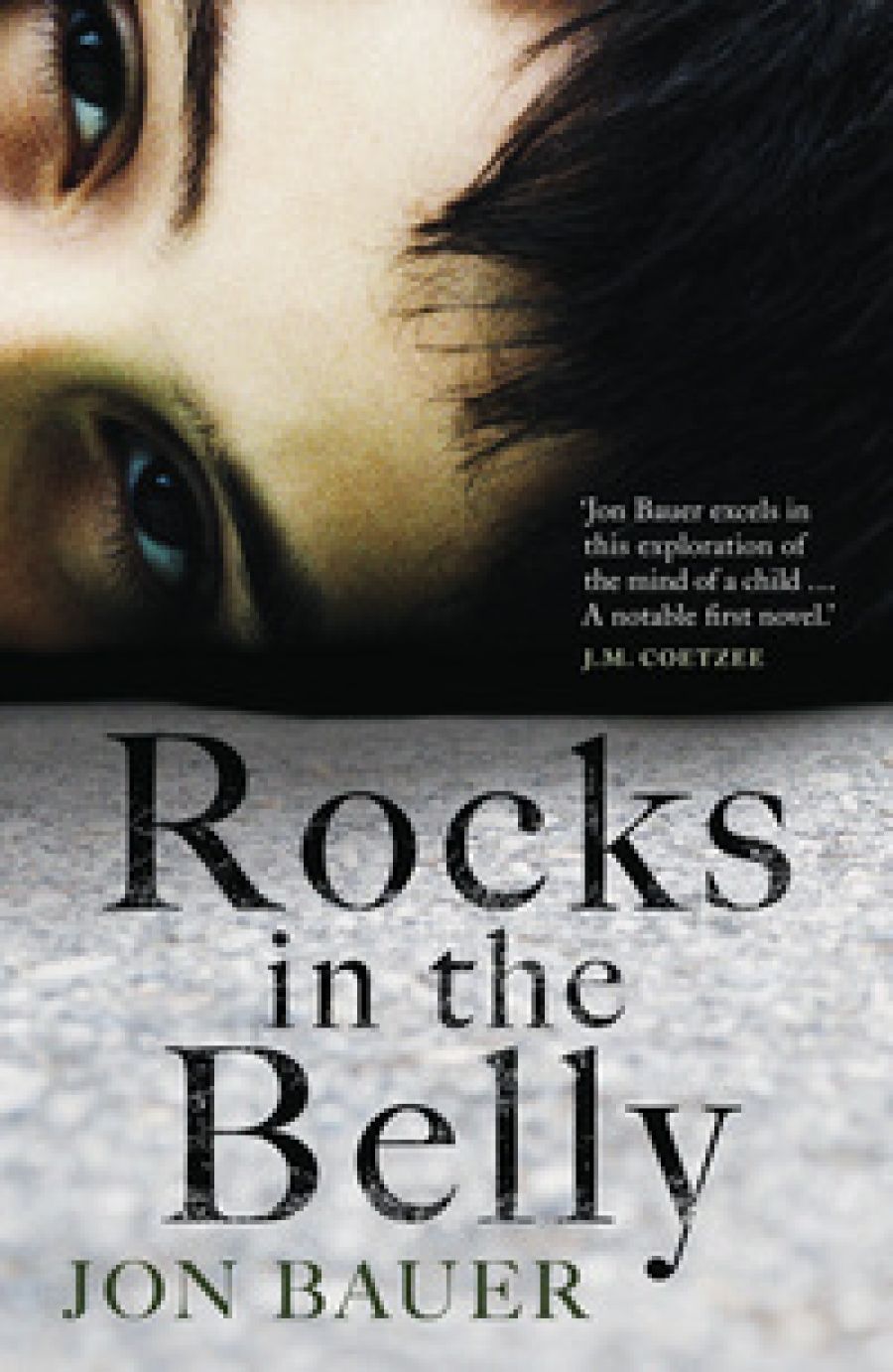
- Free Article: No
- Contents Category: Fiction
- Review Article: Yes
- Online Only: No
- Custom Highlight Text:
The two narrators in this intense novel are the same person at different ages: the child of eight years who struggles against sibling displacement; and his twenty-eight-year-old self, scarred by his early years and obsessively revisiting them. The narrative documents these two periods of emotional turmoil in the unnamed protagonist’s alternating monologues. This anonymity may signify a lack of a more integrated self, and will not be a problem for the reader. As reviewer, I will simply use personal pronouns when referring to him.
- Book 1 Title: Rocks in the Belly
- Book 1 Biblio: $32.95 pb, 296 pp, 9781921640674
Robert, aged twelve and rarely aggressive, becomes the loving surrogate child. Soon the younger boy’s jealousy and pain assume a more outward form: obstinacy, misbehaviour, cruelty. Other impulses offer relief from the displacement he feels. He thrusts his hand into an open fire and is permanently scarred; he throws a cat into the shower cubicle, drenching it with scalding water. The mother, for her part, enraged by some minor stubborness, pushes him into a freezer and shuts him in, jokingly sharing this cruel act of force with Robert. Eventually, the latter has a profoundly disabling accident involving the boy; it blights their lives forever. Robert becomes totally dependent on the mother. The son feels he has lost her completely, but his guilt and complicity are oddly balanced against Robert’s injury.
When the son returns as an adult, it is to care for his dying mother. She has the remnant of a brain tumour, a ‘black walnut’ on the CAT scans. This cancerous presence has seriously impaired her consciousness and her use of language. The previously formidable mother is now frail and dependent. The son is not without a sense of vengeance.
There is much powerful writing in this novel. The narrative lurches dramatically with the wayward and labile adult character, especially when he breaks into violence or behaves with the cruelty that began in his unhappy childhood. It becomes a compelling and rare (almost Dostoevskian) study of anger and the search for vindication, whether through sexual pleasure with women, through sudden lapses into compassion with his mother, or even through assault. He is a loose cannon. At other times he becomes embarrassing and comical. There is a fine scene in a restaurant when, waiting for his date, he drinks so much vodka he becomes clumsy, angry and self-conscious, exacerbated by her arrival, by which time he is totally confused and upset.
Some distracting representations early in the narrative undermine the story. The pressure-cooker feeling engendered by depictions of the family becomes laboured and unrelenting, as does the prose at times. Something was missing, and eventually I realised what it was: the boy never goes to school. This six hours or so, five days a week, of very different experience and friendships, does not exist in the narrative. This daily life would surely mitigate the sibling drama. Moreover, the father, beloved in every scene with the young son, is strangely under-represented in the older son’s monologues. The mother, aged sixty-two, is constantly called but also depicted as ‘an old lady’. The poor old cat in the shower incident only works if the animal is the most placid cat ever born. The volcanic anger of the son, who repeatedly punches a hapless driver inside a car, concludes with his ramming broken glass into the victim’s mouth.
These exaggerations occur within significant narrative swerves, so should not be as unconvincing as they feel. Generally, however, to my relief, the narrative gains in conviction as it progresses. The book then develops strongly through a range of psychological encounters with brief but skilfully written characters, towards a moving redemption of sorts, a late coming of age for the son as he accepts his anger and guilt, and realises that his mother was more complex than he imagined.
Rocks in the Belly, a début novel of considerable power, covers rare territory and culminates in scenes of tenderness and compassion that are never sentimental.


Comments powered by CComment